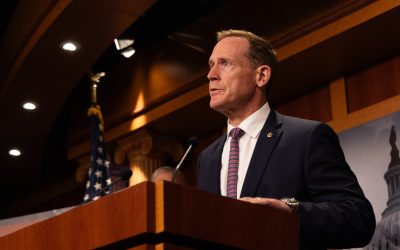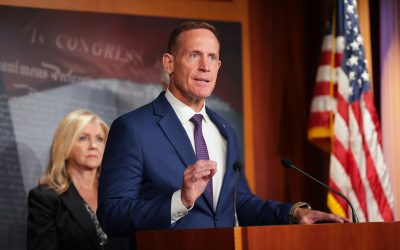Washington, D.C. — Today, the U.S. Senate passed the Federal Aviation Administration (FAA) Reauthorization Act. Senator Ted Budd (R-NC) secured nearly two dozen wins in the package for North Carolina and the flying public.
The final Senate package includes support for Boom Supersonic, which is building its facility in Greensboro; support for North Carolina’s growing UAS industry; reforms to FAA’s remote tower program, which will help pave the way for a remote tower at Concord-Padgett Regional Airport; and additional funding for North Carolina’s 72 public airports.
Senator Budd said in a statement:
“I am happy to see the FAA Reauthorization pass the U.S. Senate. The package includes several wins for North Carolina, boosts safety for the flying public, and supports the expansion of America’s aviation industry. I look forward to seeing the package signed into law.”
Some of Senator Budd’s key priorities that were added to the package include:
Expanding the Airport Improvement Program (AIP)
- Increases funding by $650 million per year to $4 billion total. This represents the first increase to the program in 12 years. This increase is fully offset by surpluses in the Airport and Airways Trust Fund.
Seeing Objects at Altitude Regularly (SOAR) Act
- Requires the FAA to issue new regulations to require that all high-altitude balloons are equipped with a tracking system that will transmit the balloon’s altitude, identity, and location.
Streamlining UAS environmental reviews
- Directs the FAA to create an efficient process for preparing environmental reviews of drone operations and to streamline the certification process.
Protecting general aviation airports from closure
- Ensures the FAA will not allow grant-obligated airports to close if the closure would impact the aeronautical purpose of an airport.
Improvements to the Designated Pilot Examiner System
- Establishes an office at FAA to provide oversight and facilitate national coordination of designated pilot examiners (DPEs). This office will help coordinate placement and deployment of DPEs across regions based on demand for examinations.
Establishing Comprehensive FAA Regulatory Review
- Establishes an internal regulatory process review team at FAA to develop a proposal to streamline the regulatory review process within 90 days and implement the report within 15 days.
Fixing the aircraft registration backlog
- To help mitigate FAA staffing issues following the COVID-19 pandemic, the provision allows an aircraft to fly past its registration expiration date if the owner files an application for re-registration 90 days in advance, carries evidence onboard, and the re-registration is not rejected by the FAA.
Increasing Competitiveness for American Drones Act
- Codifies recommendations made by the Beyond Visual Line of Sight (BVLOS) Aviation Rulemaking Committee, including streamlining approval for BVLOS operations, simplifying large UAS airworthiness certificates, and reauthorizing UAS test sites.
Expediting Rulemaking on beyond visual line of sight (BVLOS)
- Reduces the timeline for the FAA to issue the BVLOS notice of proposed rulemaking. The BVLOS rule is critical to the growth of UAS operations and is a further step toward UAS integration into the national airspace system. This industry should not have to face further delays in the rulemaking process.
Reforming the State Block Grant Program Administration
- Requires the FAA to enter into a Memorandum of Agreement (MOA) in which any state that participates in the FAA’s block grant program will have a greater say in the program and cannot be held responsible to manage any function for airport actions or projects that they did not originally agree to.
Directing FAA to continue America’s leadership in developing civilian supersonic aircraft
- Emphasizes America’s role in supersonic aircraft innovation, and adjusts eligibility for continuous lower energy, emissions, and noise (CLEEN) aircraft and engine technology cost sharing agreements to include supersonic aircraft and small and medium sized manufacturers. This will help companies like Boom Supersonic, which is building the next civilian supersonic airliner in Greensboro.
Reforming FAA’s Special Issuance medical process
- Creates the Aviation Medical Innovation and Modernization Working Group to address the considerable delays in the FAA’s processing and response to Medical Certification Special Issuance requests.
Revising sec. 620 AIP amendments on aviation fuel
- Adds an AIP grant assurance that ensures standard aviation gasoline will remain available until the FAA approves an industry-standard unleaded replacement fuel, or until 2030.
###



